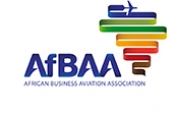Innovation takes centre stage at AfBAC 2016
Tuesday 29th November 2016
AfBAA welcomed more than 160 delegates from over 60 international and African companies, to the first ever African Business Aviation Conference held in Cape Town, November 17 - 18. The latest event in AfBAA's growing portfolio was the largest yet, and will become an annual Cape Town fixture on the aviation conference circuit.
Innovation was the conference theme and leading by example AfBAA launched the continent's first forum dedicated to RPAS (Remotely Piloted Aircraft Systems) technology. Over forty delegates learned about the possibilities for RPAS use in Africa. The highlight of the forum was a presentation about ZipLine, a company using RPAS technology, in association with the Rwandan government, to deliver urgently needed medical supplies across the difficult terrain of the country.
Underpinning AfBAA's commitment to innovation CEO Rady Fahmy used the conference as a platform to announce an expanded AfBAA collection of events. The AfBAA Regional Symposium 2017 will take place in Nigeria where West African Business Aviation will be the theme, as it runs for the first time in collaboration with the annual Nigerian Business Aviation Conference. The newly established Country Round Tables, which have already spawned the Ethiopian Chapter of AfBAA, will provide an option for specific nations to discuss the themes and topics affecting their business aviation industry as Kenya and Nigeria were announced as the next locations. Access Africa, will complement attendance at international events. Designed for companies eager to grow their business in Africa the sessions will include presentations from leading African organisations that will impart local know-how and expertise. EBACE 2017 will be the venue for Access Africa's first outing.
Fahmy also announced that Sascha Neusser of Jeppesen will be leading a new professional development programme for flight and ground operations through AfBAA's Safety and Training Committee. It is being formed in conjunction with the Association of African Aviation Training Organisations. In addition the Aviation Security Committee was launched with a vision to collate the best practices and resources to vet the risks of flying in Africa, and explore how they can be mitigated.
Training is now available for operators flying over conflict zones and can be deemed essential on a continent where at any one time conflict, hostility or emergency situations may emerge. Supporting these new events and committees is a renewed Board of Directors* who were introduced at the AGM preceding the conference. "Brimming with experience, knowledge and energy directors from twelve international and African companies, representing a full range of business aviation sectors, will now take AfBAA to the next level," said Tarek Ragheb, Founding Chairman of the Association.
The AfBAC conference delivered on its innovation promise with a first-of-a-kind line up of speakers covering new topics particularly pertinent to the African market. Ex-US Navy Seal Tom Rothrauff talked about how to manage landing in conflict areas and the psychological considerations; Pierre Lucas of the World Food Programme discussed operational challenges for emergency deliveries; whilst Jimmy Cho, a Boeing Digital Aviation specialist, explained how big data collected by omnipresent chips will affect the future of aviation; he also demonstrated how the Microsoft HoloLens technology may change the future of training through the use of augmented and virtual reality; whilst Investec economist Chris Becker explored how digital technology can advance African business, through the use of cryptocurrency, 3D printing and Apps.
Operators, technology suppliers, maintenance providers, engine manufacturers and regulatory bodies also spoke. Nuno Pereira CEO of Bestfly of Angola, and Segun Demuren, CEO of Nigeria's EAN Aviation, argued that in the current African climate business grows organically, "We are growing directly in response to market demand," said Pereira. He also encouraged competition arguing it prevents complacency. Demuren was concerned that African CAAs think about security above all else when it comes to Business Aviation, a consequence of years of conflict, "enterprise tends to come second," he lamented, "all our achievements in Africa are in spite of the government red tape."
Khader Mattar VP of Sales for Bombardier in Africa confirmed that market demand for aircraft has reduced from a few years ago but argues that it is up to the OEMs and jet brokers to manage the demand, in order to satisfy the needs. The OEM panel acknowledged that Africa is no longer the dumping ground for old aircraft. "The market is much more savvy and won't just respond to new models any more," he said highlighting the need to think smart about sales activity. "It recognizes the value of modernizing pre-owned aircraft with a good heritage. A complete overhaul and upgrade can offer an owner great value for money explained Jonathan Deutsch of JSSI. Satcom Direct's Brian Roos stated that with the right equipment installation owners can create an office in the sky to support their business for reasonable costs.
Some new business models that may have shocked twelve months ago, such as the JetSmarter membership club concept, are also providing access through democratization of private aviation on the continent. Although cultural differences, challenging regulations, permit challenges and few operators currently make this more of an idea than a reality. Atedo Peterside of ANAP Jets is pushing the fractional ownership model with Embraer Phenom 300 aircraft based in Nigeria, but acknowledged it will take time to change the perception of business jet usage even though it is a smart way to fly. "Are we selling a dream or a business tool?" asked one delegate.
Lack of operators is preventing development of the air ambulance market argued Volker Lemke of medevac specialists FAI. Whilst regional demand exists the lack of equipped aircraft, the challenge of acquiring permits and the lack of medical experts on the continent means there is a long way to go before Africa can maximize this business opportunity. Flying over hostile zones, emergency areas and conflict areas continues to be a challenge but Stanley Joseph of Universal Weather and Aviation Inc. argued that being prepared, with good local partners, information and communications, would support operations into and out of these challenging areas.
Innovation is key in supporting the market too. Pratt and Whitney Canada made its AfBAA event debut announcing the implementation of four mobile support teams strategically located to assist clients across the continent. "If we want to flourish in Africa we have to invest in support,' said Satheeshkumar Kumarasingam VP Commercial Services for P&WC. With 2165 engines currently operating on the continent it is this kind of support that is welcomed by the industry. "The PT6 is the backbone of Africa, and we're delighted to hear about PWC's further commitment to the continent," said Tarek Ragheb, AfBAA's Founding Chairman.
In closing the event Chair Alan Peaford said that "AfBAA is not just a talking shop about ideas, the association is beginning to make moves as reflected in this conference. We have touched on areas that haven't been touched before. AfBAA has made great steps."
AfBAC 2017 will be held in Cape Town in November. See www.afbaa.org for more information.
About AfBAA
The African Business Aviation Association was launched in May 2012 to represent the interests of the Africa's aircraft owners, operators, and suppliers to the Business Aviation community in a single voice. AfBAA currently has 115 members in total.
AfBAA's primary objective is to promote the understanding and benefits that Business Aviation provides for the Continent's economic development and prosperity through advocacy.
As an active, well funded, professionally run organisation AfBAA is committed to increasing membership, raising awareness of the Association internally and externally in Africa and supporting all entities involved in Business Aviation in Africa.
Chairman Tarek Ragheb, and Executive Director Rady Fahmy, work with the Founding Members and Board of Directors to lead development of the Association.
Latest News

Tuesday 4th March 2025
Gama Aviation sees increasing business aviation traffic through Sharjah International Airport









Get Social
Twitter Linked in Facebook Instagram